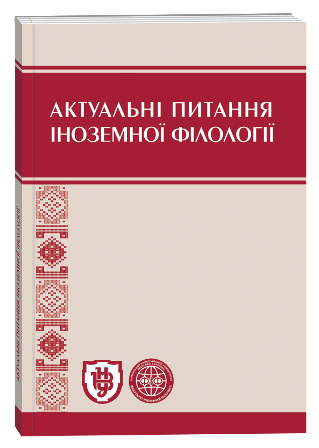FORMATION OF FUTURE MANAGER’S PROFESSIONAL COMMUNICATVE CULTURE
DOI:
https://doi.org/10.32782/2410-0927-2022-16-28Keywords:
culture of communication, professional activity, specialists-managers, norms of Ukrainian literary language, professional foreign language, communicative skillsAbstract
The article analyzes the research of Ukrainian and foreign scientists on the formation of a professional communicative culture of future managers. The essence of the author’s training program and the peculiarities of the activities of future managers at one of the stages of training are revealed. Exercises for the development of future managers’ self-confidence, ability to evoke working well-being are given. An example of a business game and analysis of its results are given. The reasons for deviations from the norms of professional communication, avoidance of errors in communication of students, future managers, because the insufficient level of communicative culture can cause significant economic losses. The aim of the article is to highlight the problem of forming a culture of professional communication, which is an organic component of professionalism of a business person. The study is based on theoretical methods, including analysis and generalization of research results on the culture of professional business communication, conclusions. Suggestions to add language characteristics to the description of a person’s business qualities remain relevant today: whether or not he or she is able to express his/her thoughts clearly and concisely, as communicative culture is an important aspect of diverse impact on the listener. Proper oral and written language can ensure the speed of mutual understanding between the participants of the communicative act. The relevance of the study, which is due to the need to cultivate a conscious desire to study the culture of professional communication. It is substantiated that an important aspect of professional language training of specialists-managers is knowledge of the norms professional communication and constant skillful use of them. It is generalized that the culture of communication is a part of the general professional culture of a specialist in any field of activity, including economic profile, and its absence is evidence of indifference and illiteracy.
References
Бичок А. В. Формування культури професійного спілкування майбутніх фахівців міжнародного бізнесу і менеджменту. Автореф. дис. … канд. пед. наук: 13.00.04 – теорія і методика професійної освіти. Тернопільський національний педагогічний університет імені Володимира Гнатюка. Тернопіль, 2010. 19 с.
Бутенко Н. Ю. Комунікативні процеси у навчанні : підручник. Вид. 2-ге, без змін. К. : КНЕУ, 2006. 384 с.
Етика ділового спілкування : курс лекцій / [Т. К. Чмут, Т. Л. Чайка, М. П. Лукашевич, І. Б. Осетинський]. К. : МАУП, 1999. 2008 с.
Иванова Т. В. Культура педагогического общения и ее формирование у будущего учителя. Уфа : Башгосуниверситет, 2000. 164 с.
Комарова І. І. Формування у майбутніх учителів культури педагогічного спілкування. Автореф. дис. … канд. пед. наук: 13.00.04 / Тернопільський державний педагогічний університет ім. В. Гнатюка. Тернопіль, 2000. 19 с.
Культура фахового мовлення : навчальний посібник / [За ред. Н. Д. Бабич]. Чернівці : Книги – 21, 2006. 496 с.
Лівенцова В. В. Формування культури професійного спілкування у майбутніх менеджерів невиробничої сфери : дис. … канд. пед. наук: 13.00.04. Тернопіль, 2002. 212 с.
Рукас Т. П. Формування культури ділового мовлення в майбутніх менеджерів : дис. … канд. пед. наук. Київ, 1998. 173 с.
Савенкова Л. О. Професійне спілкування майбутніх викладачів як об’єкт соціально-педагогічного управління. Київ : КНЕУ, 2005. 208 с.
Фатихова Р. М. Культура педагогического общения и ее формирование у будущего учителя. Уфа : Башгоспедуниверситет, 2000. 164 с.
Хміль Ф. І. Ділове спілкування: Навчальний посібник для студентів вищих навчальних закладів. К. : «Академвидав», 2004. 208 с.







